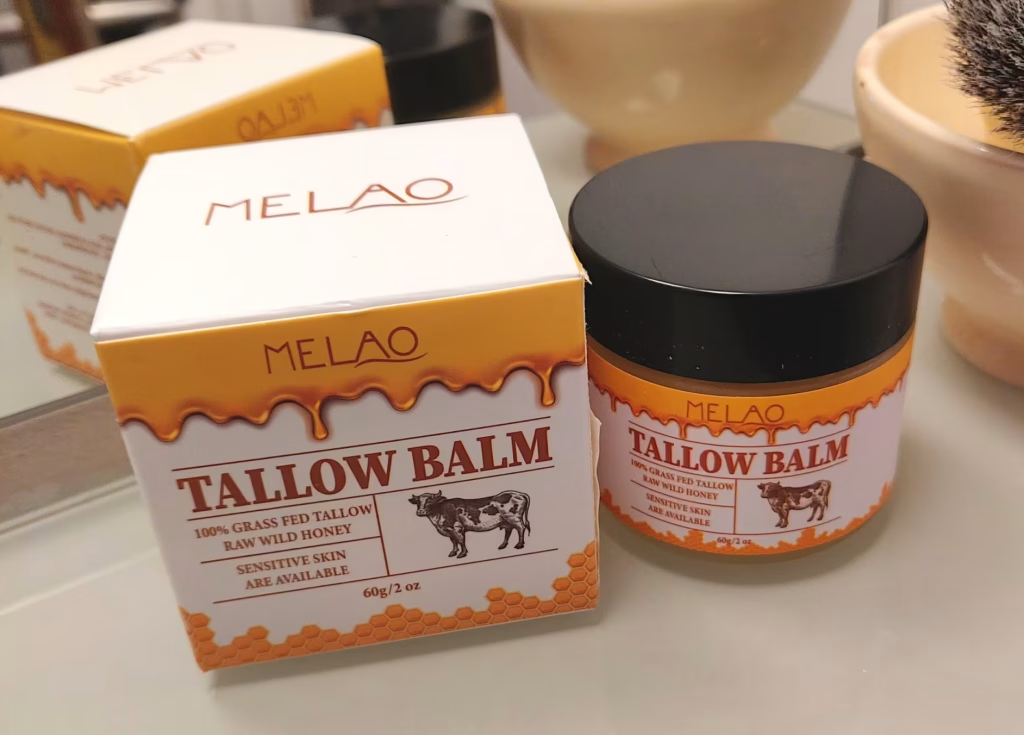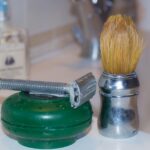Does your face feel better if you don’t wash it at night? Make nighttime cleansing tenable by adding just two products to your routine.

I would never go to bed without cleaning my teeth or applying oil to my mustache.
But washing my face? That was something else.
I know that nighttime cleansing is marketed as non-negotiable, but my skin always felt off or uncomfortable afterward.
In an attempt to do the right thing, I’d try to make a routine of it. Unfortunately, the stinging and burning would begin after only a couple of days. Even moisturizer caused facial distress.
So, to prevent my face hurting, I’d apply night cream without cleansing.
Speaking to other men, I discovered that I wasn’t alone in this predicament. It seems that few of us tolerate more than a once-daily cleanse, usually under the shower in the morning.
And another thing many of us don’t like about nighttime cleansing—the stress.
With water dripping off my elbows while rinsing away stubborn suds, I’d wonder if possible soap residue wasn’t doing my skin more harm than good. Then, with my face stinging, I’d have to mop up puddles while worrying that I was no longer tired enough to sleep, which would mean exhaustion the following day.
Surely it wasn’t worth it. Besides, my skin looked great without this kerfuffle.
What Changed?
Then, due to broken capillaries on my nose, my dermatologist prescribed tretinoin (better known as Retin-A). This is a vitamin A-based product that potently stimulates collagen production to make the skin appear thicker, thus causing it to become less transparent. Because efficacy diminishes when exposed to ultraviolet light, its use should be left for after dark.
And to be fully beneficial, the skin must be cleansed beforehand. This, unfortunately, is true of all treatments, whether a retinol, an acid, a peptide, or a vitamin.
Rather than risk chronic irritation, I wondered if it would be better to just live with the broken capillaries.
I voiced my concerns, to which my dermatologist recommended exorbitantly priced cleansers and creams that made no difference. This led me to do a little research of my own before giving up completely.
As a result, I found something that works—even if you’re using a product as aggressive as tretinoin 0.1%, as I do.
But first, let’s look at why skin is more sensitive at night—and why cleansing is always essential.

Why Nighttime Cleansing Causes Discomfort
It’s no wonder most of the men I’ve spoken to report discomfort after cleansing at night: it’s down to circadian biorhythms—the body’s internal clock that orchestrates our biological choreography, including hormone levels.
After sunset, the sleep hormone melatonin signals the body to rest and repair. It’s a process that requires the skin to become more permeable and, consequently, more vulnerable.
It means a reduction in sebum production, which depletes the natural cushion that buffers against cleansers. At the same time, transepidermal water loss (TEWL) peaks, further weakening the skin barrier. That’s what makes your face feel uncomfortable after cleansing.
Other nocturnal shifts include increased blood flow, which heightens sensitivity to touch; falling cortisol levels that reduce the skin’s ability to calm irritations; and a dip in skin temperature, making even the mildest cleansers seem harsh.
Why Nighttime Cleansing Is Important
I may have thought my skin looked great without washing my face at night, but it’s not a good idea if you want to look good long-term.
Here’s why you should never skip your nighttime cleanse.
- It removes daily buildup from sweat, oil, and pollution—the latter is a major factor in aging.
- Prevents acne and breakouts, especially if you have oily or combination skin. Sebum and dead cells trapped beneath the day’s grime can fuel outbreaks.
- Supports skin repair and regeneration: skin renews overnight—cleansing clears the way.
- Boosts circulation and cell turnover, which is key to minimizing fine lines and wrinkles.
- Mitigates transepidermal water loss if you’ve chosen the right cleansing and moisturizing products, leading to improved hydration.
- Minimizes excess oil production.
- Keeps pillow-cases cleaner—this means fewer bacteria and less irritation.
Nighttime Cleansing Without Discomfort
Showering and Shaving at Night
Men with a slower beard growth rate may want to shower and shave at night to save time in the morning. The question is, how can you do this without triggering nocturnal sensitivity?
First, let it be said that cortisol levels are higher in the morning, making the skin less reactive. But if you still want to shave at night, shower afterward in order that shaving residue is thoroughly rinsed away.
For men who believe in softening whiskers before shaving, use a warm washcloth barber-shop style.
You could also apply a pre-shave oil, which acts as a barrier between your skin and the lubricant. It doesn’t have to be labelled “shaving oil”; the sunflower oil in your pantry will do the same.
Skip Water Altogether
If you wash over the sink, that’s where the trouble often begins. Whether you rinse with a washcloth or splash your face the recommended 30 times, residue will linger. Even the mildest non-foaming facial cleanser can cause irritation on compromised skin—don’t forget, its barrier is permeable at night.
Some men out there claim that their good complexion is down to washing with water only. I’ve tried it, but even this causes discomfort.
Therefore, the only thing to do is avoid water altogether.
Micellar Water
I’ve tried gels, milks, and creams, but the only product that allows nighttime cleansing without irritation is no-rinse micellar water.
This is composed of tiny oil-attracting molecular structures called micelles, which are suspended in purified or deionized water.
Micelles act like magnets, lifting away dirt, oil, sunscreen, and impurities without rubbing, rinsing, or disrupting the barrier.
But not all micellar waters are created equal.
Top formulas share a few key traits: they’re fragrance-free, low in surfactants, gentle enough to use around the eyes, and labeled “no-rinse”—this is crucial.
Don’t worry too much about your specific skin type; our problem is nocturnal sensitivity. Therefore, a product for reactive skin is where you should begin.
My recommendation is CeraVe’s Hydrating Micellar Water—not only because it fulfills the above-mentioned traits, but because it contains ceramides—more on that in a moment.
How to Use Micellar Water
This is so simple, it barely deserves its own heading.
Apply micellar water with gentle sweeping motions using a lint-free cotton pad. Never rub, and make sure your face is dry before application.
But this shouldn’t be your only cleanser—it’s not thorough enough for that. Use only at night. In the morning, wash your face in the shower with a non-foaming facial cleanser for a deeper clean.
Men who prefer to shower at night could alternate with time-saving micellar water in the morning.

Moisturize With a Reparative Night Cream
Although micellar water contains active ingredients, concentrations are too low to meet treatment thresholds. That’s why it’s important to follow nighttime cleansing with a cream; one with ceramides at best.
What Are Ceramides?
Simply put, ceramides are fatty molecules that make up about 50% of your skin’s outer layer. Think of them as the mortar between the bricks—the bricks being your skin cells. Together, they form the barrier that keeps moisture in and irritants out. They are your skin’s natural armor.
As such, a ceramide-rich cream will lock in hydration to prevent transepidermal water loss (TEWL) while working as a buffer to prevent treatments from weakening the barrier.
Which Ceramide Cream?
Before I lose all credibility, let me explain.
After I began my treatment with tretinoin, my skin was at its very worst. Not only the usual peeling that occurs during the first couple of weeks, but painful sensitivity.
I browsed the internet for a solution and came upon ceramides. It was a Saturday evening, and the only store open in my part of Europe at the time was a supermarket.
There I found L’Oréal’s Hydra Active 3 for sensitive skin, which is a 24-hour cream (day and night). It’s a brand I generally avoid, but it worked immediately and I’ve stuck with it ever since.
Instead of sunscreen, it uses ethylhexyl salicylate. This is inert unless exposed to UV light and won’t irritate the skin or block any treatments you apply afterward. In other words, it’s safe to sleep with.
There is, however, no indication that it’s non-comedogenic.
For men with acne-prone or combination skin, apply a ceramide serum instead, followed by a water-based gel-cream moisturizer.
This hybrid offers a balance between hydration and barrier repair, without the weight of traditional creams. Look for non-comedogenic formulations with humectants like glycerin or hyaluronic acid.
The serum provides resilience; the gel-cream locks it in without suffocation.
How to Apply Ceramide Cream
Apply while your skin is still moist from your micellar water, massaging in upward and outward motions. And don’t forget the eye area.
If you’re using it as a buffer, allow it to sit for 10 to 15 minutes before adding your treatment—in my case tretinoin.
Alternatively, if you’re not using a treatment, apply a layer of beef tallow balm or petroleum jelly for a “slugging” effect. This intensifies the benefits of the ceramides for a quicker recovery.
© 2025 J. Richardson
Related Posts
Disclaimer
The information provided by The Neat and Tidy Man (“we,” “us,” or “our”) on theneatandtidyman.com (the “site”) is for general informational purposes only. While we endeavor to keep the information up to date and correct, we make no representation or warranty of any kind, express or implied, regarding the completeness, accuracy, reliability, suitability, adequacy, validity, or availability of any information on the site. Under no circumstance shall we have any liability to you for any loss or damage of any kind incurred as a result of the use of the site or reliance on any information provided on the site. Your use of the site and your reliance on any information on the site is solely at your own risk.



